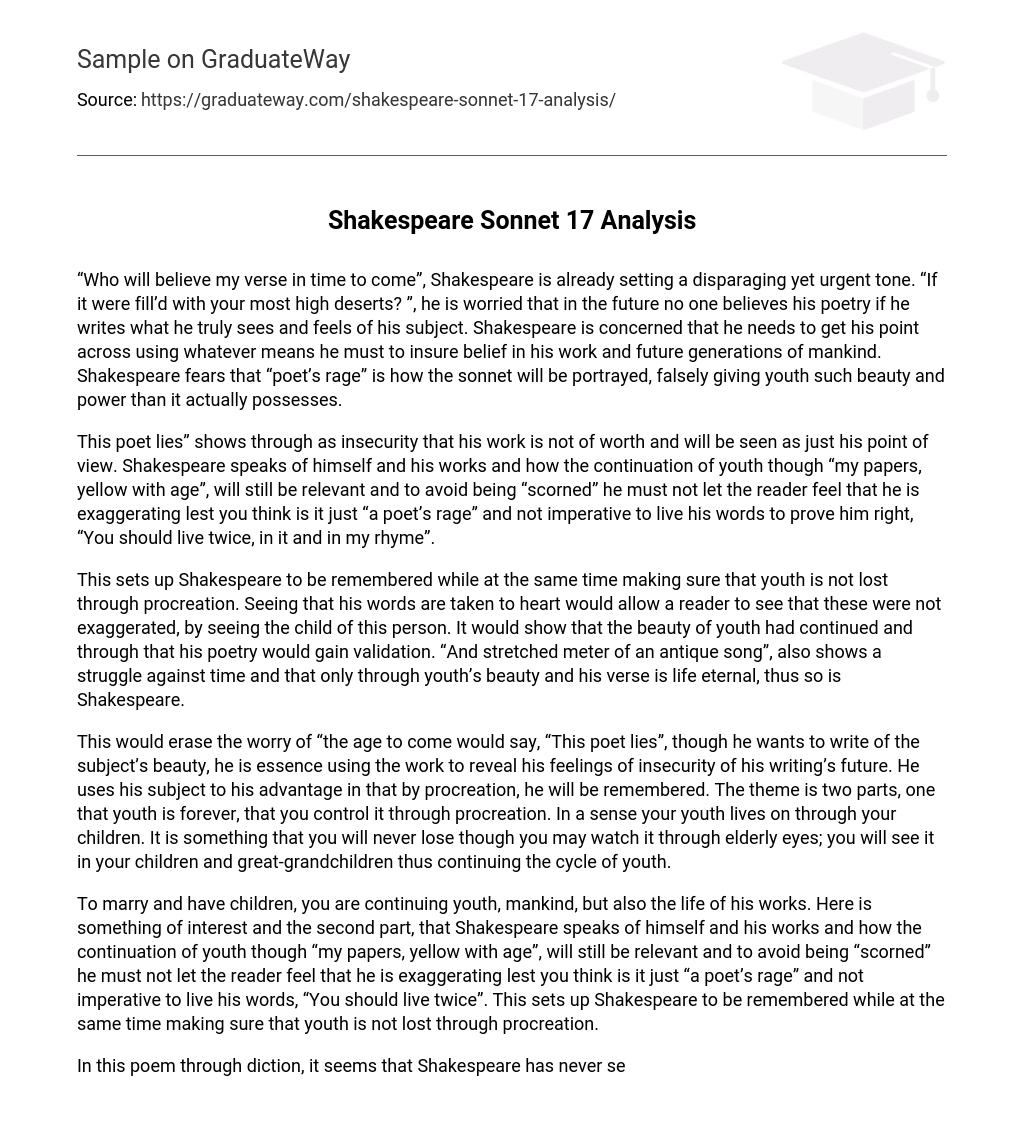“Who will believe my verse in time to come”, Shakespeare is already setting a disparaging yet urgent tone. “If it were fill’d with your most high deserts? ”, he is worried that in the future no one believes his poetry if he writes what he truly sees and feels of his subject. Shakespeare is concerned that he needs to get his point across using whatever means he must to insure belief in his work and future generations of mankind. Shakespeare fears that “poet’s rage” is how the sonnet will be portrayed, falsely giving youth such beauty and power than it actually possesses.
This poet lies” shows through as insecurity that his work is not of worth and will be seen as just his point of view. Shakespeare speaks of himself and his works and how the continuation of youth though “my papers, yellow with age”, will still be relevant and to avoid being “scorned” he must not let the reader feel that he is exaggerating lest you think is it just “a poet’s rage” and not imperative to live his words to prove him right, “You should live twice, in it and in my rhyme”.
This sets up Shakespeare to be remembered while at the same time making sure that youth is not lost through procreation. Seeing that his words are taken to heart would allow a reader to see that these were not exaggerated, by seeing the child of this person. It would show that the beauty of youth had continued and through that his poetry would gain validation. “And stretched meter of an antique song”, also shows a struggle against time and that only through youth’s beauty and his verse is life eternal, thus so is Shakespeare.
This would erase the worry of “the age to come would say, “This poet lies”, though he wants to write of the subject’s beauty, he is essence using the work to reveal his feelings of insecurity of his writing’s future. He uses his subject to his advantage in that by procreation, he will be remembered. The theme is two parts, one that youth is forever, that you control it through procreation. In a sense your youth lives on through your children. It is something that you will never lose though you may watch it through elderly eyes; you will see it in your children and great-grandchildren thus continuing the cycle of youth.
To marry and have children, you are continuing youth, mankind, but also the life of his works. Here is something of interest and the second part, that Shakespeare speaks of himself and his works and how the continuation of youth though “my papers, yellow with age”, will still be relevant and to avoid being “scorned” he must not let the reader feel that he is exaggerating lest you think is it just “a poet’s rage” and not imperative to live his words, “You should live twice”. This sets up Shakespeare to be remembered while at the same time making sure that youth is not lost through procreation.
In this poem through diction, it seems that Shakespeare has never seen someone as beautiful as this, “Such heavenly touches ne’er touched earthly faces”, and people reading would never believe him nor could such a person exist. Reason being, beauty is in the eye of the beholder, so Shakespeare though may believe this to be the most beautiful, you may not agree. But, by having children, future generations will carry that beauty and then there is concrete proof not only of the beauty, but also of his words.
He is very careful in the words used so there would not be the perception of lying. “Though yet heav’n knows it is but a tomb…and shows not half your parts”, reveals that though he wishes to go on of the beauty that is beyond human perception, he holds back and states that the heavens knows it to only a small insight to the true beauty. Yet, for me this seems to indicate that there is more than physical beauty that Shakespeare is alluding to and cannot be visualized or written without ridicule of pure flamboyancy and considered far from realistic.





